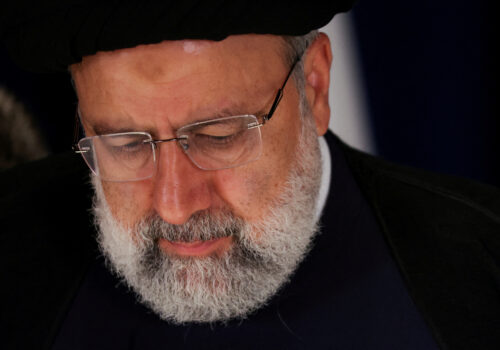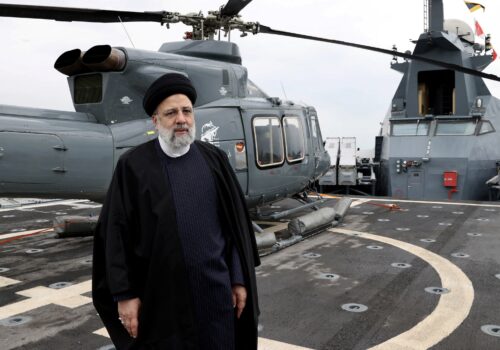Netanyahu’s political survival rests on a strategic awakening
Growing threats to Israeli Prime Minister Benjamin Netanyahu’s political survival may have a greater immediate impact on the Middle East than the death of Iranian President Ebrahim Raisi in a helicopter crash on Sunday.
Raisi’s death, at age sixty-three, “is rather unlikely to alter Iran’s strategic direction in either domestic or foreign policy,” argues the Atlantic Council’s Jonathan Panikoff, noting that “ultimate power” rests with Iran’s supreme leader. What his passing does inevitably influence is Iranian succession, with the odds now shifting from Raisi to favor Ayatollah Ali Khamenei’s fifty-five-year-old son, the Shia cleric Mojtaba Khamenei.
Of greater short-term importance, though lost in much of the international media coverage in recent days, is the new threat to Netanyahu’s political survival from opposition figure and retired general Benny Gantz.
In a televised statement on Saturday, Gantz said that he would leave Netanyahu’s coalition by June 8 if the prime minister doesn’t agree to a six-point plan that includes a template for Gaza’s post-war governance.
The departure of Gantz’s National Unity party, which polls predict would become the biggest group in the Knesset following new elections, wouldn’t necessarily topple Netanyahu’s government. However, it is another significant sign that Netanyahu’s inability to lay out a strategic plan for Gaza’s future and Israel’s security has not only caused greater strains with the United States, as I argued in this space last week, but is also further eroding his tenuous hold on power in Israel.
Never was that more evident than last week, when Israeli Defense Minister Yoav Gallant gave voice to those mounting doubts on behalf of the country’s national security establishment.
“I call on Prime Minister Benjamin Netanyahu,” he said, “to make a decision and declare that Israel will not establish civilian control over the Gaza Strip, that Israel will not establish military governance in the Gaza Strip, and that a governing alternative to Hamas in the Gaza Strip will be advanced immediately.”
Yet even as domestic pressure mounts on Netanyahu to change course, the chief prosecutor of the International Criminal Court, Karim Khan, inadvertently prompted even the prime minister’s critics to circle the wagons on Monday by seeking arrest warrants for him and Gallant, along with three Hamas leaders, on accusations of war crimes.
US President Joe Biden—who called Khan’s application for arrest warrants “outrageous”—has taken sharp criticism for having backed Netanyahu too unconditionally. But it’s clear that his increasingly open questioning of the Israeli leader’s course, including threatening to withhold additional arms shipments, has opened space for the likes of Gantz and Gallant.
It’s in that context that White House National Security Advisor Jake Sullivan met Monday with Gallant, War Cabinet members Gantz and Gadi Eizenkot, opposition leader Yair Lapid, and Israel Defense Forces Chief of Staff Herzi Halevi. A day earlier, he had met with Palestinian leaders, and before that he met top Saudi leaders in Riyadh.
Importantly, Sullivan, in his meeting on Sunday with Netanyahu, urged the Israeli leader to connect his war efforts to a “political strategy that can ensure the lasting defeat of Hamas, the release of all hostages, and a better future for Gaza.”
It shouldn’t be necessary to add: Netanyahu’s political survival increasingly rests on his ability to think and act more strategically about the connected futures of Gaza, Israel, and the wider Middle East.
Frederick Kempe is president and chief executive officer of the Atlantic Council. You can follow him on Twitter: @FredKempe.
This edition is part of Frederick Kempe’s Inflection Points Today newsletter, a column of quick-hit insights on a world in transition. To receive this newsletter throughout the week, sign up here.
Further reading
Mon, May 20, 2024
Experts react: The ICC prosecutor wants Netanyahu and Hamas leaders arrested for war crimes. What’s next?
New Atlanticist By
International Criminal Court Prosecutor Karim A.A. Khan just applied for arrest warrants for Hamas chief Yahya Sinwar and Israeli Prime Minister Benjamin Netanyahu, among others.
Mon, May 20, 2024
What comes after Ebrahim Raisi
New Atlanticist By Jonathan Panikoff
While the Iranian president's death in a helicopter crash was shocking, it is unlikely to change the country's strategic direction. Here's why.
Mon, May 20, 2024
Experts react: Iranian President Ebrahim Raisi is dead in a helicopter crash. What’s next for the regime?
New Atlanticist By
The Iranian president and foreign minister died in a crash on Sunday in northwestern Iran. Atlantic Council experts offer their insights on the implications for the Islamic Republic.
Image: Israeli Prime Minister Benjamin Netanyahu speaks during a press conference with Defense Minister Yoav Gallant and Cabinet Minister Benny Gantz in the Kirya military base in Tel Aviv , Israel , 28 October 2023. ABIR SULTAN POOL/Pool via REUTERS


